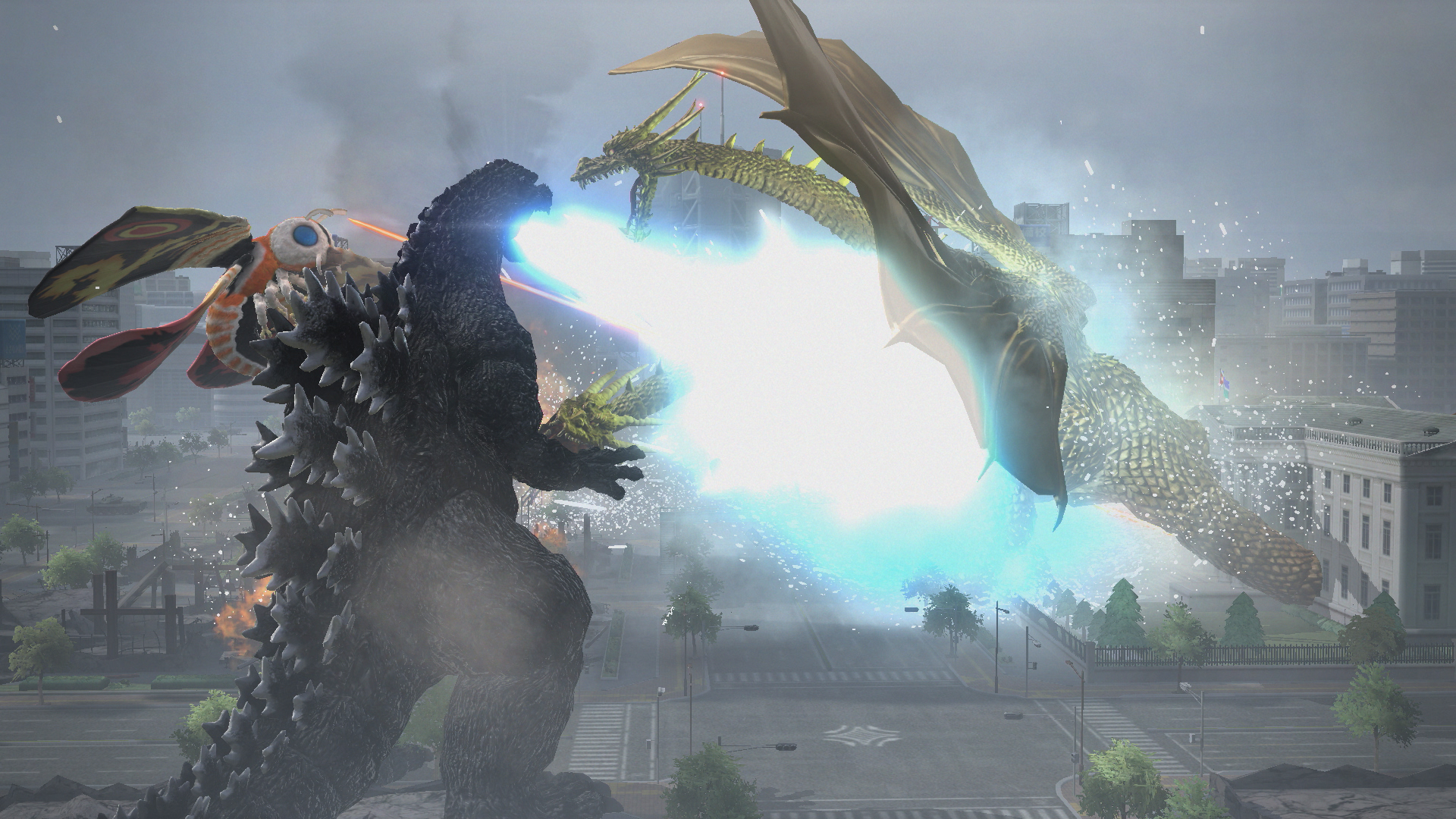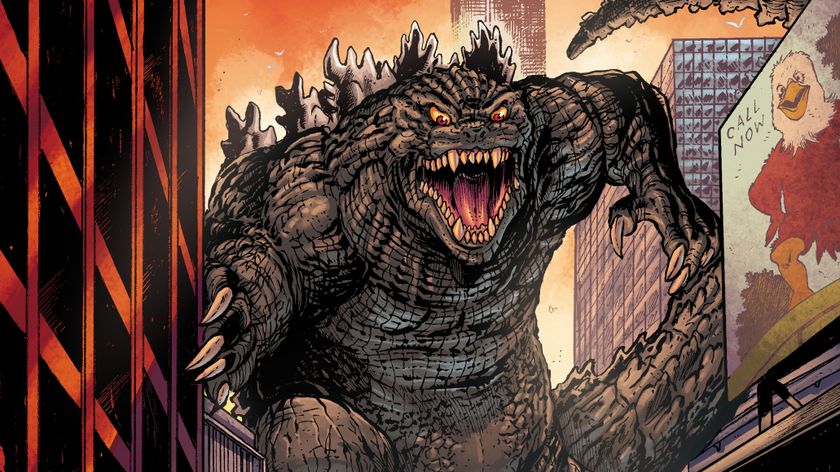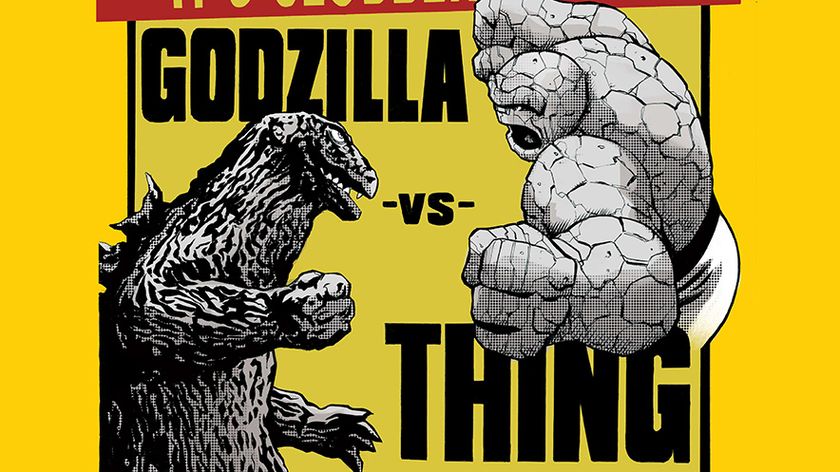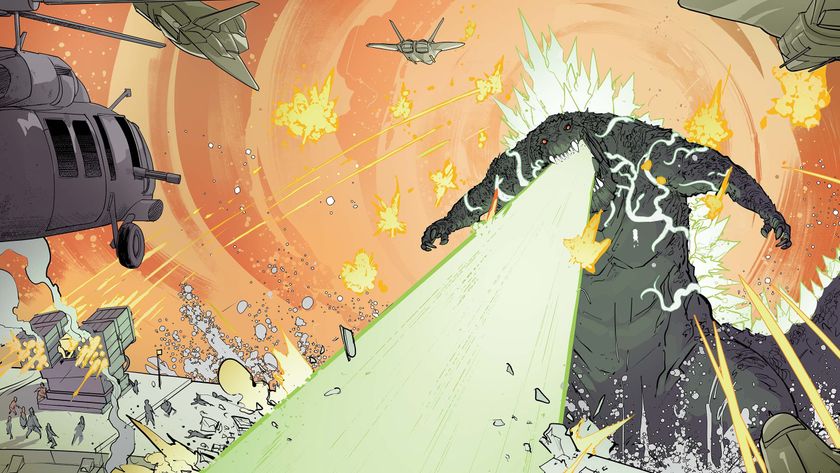12DOVE Verdict
You would think a game in which you can pimp-slap a moth as a 40ft-tall garbage monster couldn’t possibly be that bad. You would, however, be wrong.
Pros
- +
Dozens of playable kaiju from Godzillas 60-year history
- +
Learn about Godzillas absurd menagerie in the encyclopedia
Cons
- -
The slowest
- -
clumsiest fighting system in recent memory
- -
Woeful visuals and a headache-inducing frame-rate
- -
Writing so bad its almost good. Almost
- -
Unlocking and upgrading monsters requires endless grinding
Why you can trust 12DOVE
Lurching mysteriously from Bandai Namco’s churning seas, the inexplicable arrival of the game simply known as Godzilla provokes the same befuddled panic as if an actual kaiju showed up. Where did it come from? Why is it here? What did we do to deserve it? And most importantly, why is it so monstrously awful?
Godzilla can best be described as a slow motion beat-’em-up. Two monsters enter a flat urban arena, full of flimsy buildings that somehow know to collapse after precisely three hits, enclosed within a glowing orange barrier you can’t step over for some reason, and only one triumphantly waddles off. A story mode called God of Destruction attempts to string everything together under a bizarre invasion narrative, but fails pretty spectacularly.
It begins with a playable black and white segment in which you plod into Tokyo, greedily chow down on nuclear waste, and leave without so much as a “thank you”. Although traumatic for all involved, and generally quite rude, the attack kickstarts Japan’s energy research and the nation flourishes. 60 years later the radioactive lizard returns like a fat neighbour to gorge on now abundant quantities of delicious G-Energy.
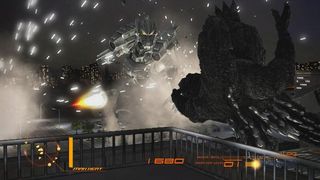
Each three-minute stage sees Godzilla whack energy generators with monotonous attacks, retreat slightly from a timed force field, then whack them again until they explode, meanwhile swatting away buzzing choppers and treading on tiny toy-like tanks that are never more than completely ineffectual. About halfway through the level a kaiju shows up for a hilariously bad scrap. In fairness, rams, grabs, three-strike combos, and projectiles all feel incredibly weighty thanks to long wind-ups and extended contact delays to emphasise impact, and some moves, such as frying an enemy with a blast of Godzilla’s plasma breath, result in spectacular spark-filled light shows.
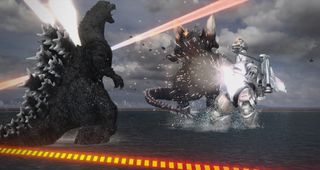
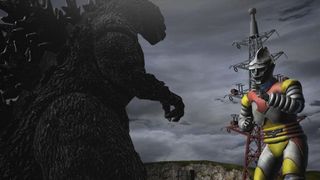
In diorama mode, you can pose any kaiju you’ve unlocked and take pictures of them just like that Annie Leibovitz. Trouble is, it takes so long to unlock stages and monsters that you’ll be done with the game long before amassing anything interesting to shoot, and since the interface is grid-based, you can only plonk figures on specifically designated spots. Also, realistically, who’s going to look at all the pictures you took? Your mum?
The downside to this manufactured sensation of heaviness is, of course, fights that play out incredibly slowly. When the only speed is ‘shuffle like you’re a man in 200 pounds of heavy-duty rubber’, there’s not much to combat besides wading into each other and windmilling like drunken bridesmaids at a wedding. There’s no block button, and since strafing is about as effective as trying to sidestep a shark underwater, there’s little reason to move in any direction but forward, then back while you wait for your special to recharge, then forward again. It’s essentially a reskinned Rock'em Sock'em Robots.
Soon you’ll work out which move is most effective and stick rigidly to it. A typical battle with Classic Godzilla, the default kaiju unlocked, involves pressing X (on PS4) to close the gap by charging, weathering a few blows, then pressing the right trigger to stagger your foe with a roar. That’s it through the entire story. Enemies stick to the same cheesy tactics, too: at one point a caravan-sized maggot headbuts then shoots silly string at me and I’m helplessly staggered for 15 agonising seconds.
Speaking of which, it’s one of the strangest, most tonally confused campaigns in some time. A triumphant jingle plays after beating a level before abruptly cutting to a mournful refrain as if the game suddenly remembers all the livelihoods you’ve ruined. And for some reason a G-Force operative who appears in the corner of the screen to inadvertently guide you in the right direction by saying things like, “The kaiju is dead, so he’ll surely head for the generators!” unaccountably seems to know the name of every monster when they arrive, announcing them like they’re heading down the ramp at the Royal Rumble. The awful writing is the only consistent thing about it.
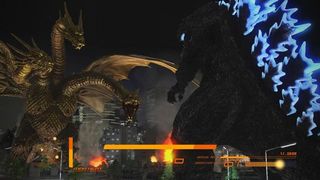
You can choose two paths through the city, and each region is governed by a different leader. Hatogaya is a compassionate man, seeing you as “No different to the family dog,” and therefore sending less militia your way, while Takasu, clearly less of an animal lover, orders more. One particularly difficult section involves having to beat MechaGodzilla then destroy three generators in three minutes before they go into lockdown. It took me multiple, frustrating attempts.
Only by completing God of Destruction over and over again can you unlock new characters, and despite it being necessary to grind for currency which you put towards new purchases, playing as dozens of classic kaiju is an undoubted draw. There’s King Ghidorah and his triple-laser-spewing heads, blade-armed robot Gigan, a grinning armadillo thing called Anguirus, and a garbage monster who I respect so little I haven’t even bothered to note his name.
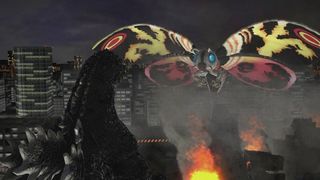
Although in God of Destruction you’re limited to playing as Godzilla, a spin on the mode called Invade lets you pick any kaiju you want, while Defend sees you again play a kaiju of your choice but this time attempting to limit the destruction of whoever you’re up against (note: it’s pretty hard not to cause collateral damage when you’re a giant space worm). Nothing here adds much to the game, though.
Meanwhile the King of Kaiju mode is a barebones time-trial in which players see how long it takes to defeat a string of six opponents, and finally there’s a Vs mode which unfortunately focuses on 1v1 online-only fights. It’s a baffling decision since this is such perfect, stupid, split-screen fodder.
The Kaiju Guide is about the only well-designed thing here, an in-game encyclopedia featuring pictures and paragraphs detailing Godzilla’s weird and wonderful monsters. Did you know that Baragon burrowed underground and survived the Cretaceous extinction event while most other dinosaurs died? Now you do.
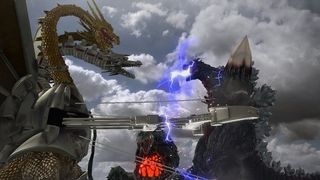
Who knew that designing a fighting game around lumbering latex monsters from horrendously dated B-movies would suck? While spending 30 seconds reeling off each kaiju’s unique attacks provides fleeting fun - because how can barrelling into a giant metal man as a spiked mutant armadillo not be? - a complete absence of defensive moves and an absolutely glacial pace means Godzilla simply doesn’t work as a fighting game. That’s quite a problem for a game in which you fight a lot. What a radioactive waste.
More info
| Genre | Action |
| Description | Walk in the footsteps of the iconic monster in this insect smashing building basher. |
| Platform | "PS4","PS3" |
| US censor rating | "Teen","Teen" |
| UK censor rating | "","" |
| Release date | 1 January 1970 (US), 1 January 1970 (UK) |
Most Popular




